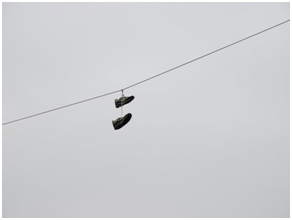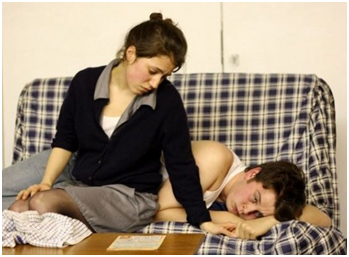Fear of Music writer Barney Norris on rewrites, the army, and the strange fame of Andover.
In 2008 I was in a play called Through the Leaves by the German writer Franz Xaver Kroetz, in a production directed by Alice Hamilton, the director of Fear Of Music. I hadn’t previously encountered Kroetz, Germany’s most frequently performed living playwright, and his work fascinated me. I thought Through The Leaves was incredible: a portrait of a failed affair between a butcher and a roaming drunk (that was me) that put life on stage and demanded we pay it attention. I thought, I want to write a play like that. I’d just written my first short play, a piece called At First Sight about the memory of a failed affair, which was very romantic, and wanted to try something different. This uncompromising portrait of real life, not commenting, just showing, struck me as an exciting model.
The story of Fear Of Music started with two ideas. Firstly, I thought I could write about the experience of sharing a bedroom with your brother; secondly, I wanted to explore an image Alice’s mother Jane had put in my head. Jane told me that on the day she had moved out of her childhood home, the last time she looked into the kitchen, she had seen herself and her family five years earlier in the room – not remembered it, but seen the memory taking place in front of her eyes. I thought that was an amazing trigger for a play, so I wrote about two brothers refracted through the lens of memory. Alice didn’t think it was very good. I did a workshop and a reading and discovered she was right. The play went on the back burner, a story without impetus I put in a drawer.
Then, in 2010, I walked past an army recruitment poster that said ‘this is my life: I want to do more with it than flip burgers’, and knew at once that I had to go home and get back to writing. The slogan struck me as an incredibly offensive piece of bullying – a targeted belittling by the state. The idea that the Army marketing department might play on the insecurities of ordinary people suffering from a lack of opportunity in order to put them in the line of fire seemed abhorrent: so I went home and wrote another layer into my story. I organised another reading, and Alice and I began to plan a production.

I’m cautious about sounding rabidly anti-army. This November 11th the company of Fear Of Music went to the Remembrance Day service in Andover, where the play is set. We were struck by the beauty of the idea the army presented of itself at that ceremony, which strikes me as the central ritual of our society (it seems to me that England in the last century has been, above all, a story about the war). My grandfather lost three brothers in the Great War, and still lives a hundred metres from the memorial where their names are inscribed. The sacrifices made by soldiers for my life are woven into my family’s identity, and at that level, the level of the individual soldier, I feel conscious of a tremendous debt to the people who make up the army. But my argument wasn’t with them. The army is an arm of the state – and it’s a failure of our state if, rather than working to improve conditions for those on low incomes or in deprived areas, we exploit their insecurities and aggress them into barracks, a systematic practise documented by Forces Watch: http://www.forceswatch.net/what_why. It’s feudal.

Andover: around the world, shoes over a telegraph wire can mean a drug dealer’s patch, the death of a gang member or, presumably, boredom.
I hadn’t known at first that I wanted to set the play in Andover. But then the Tories got into power and in late 2010, while I was working at the Bush Theatre, announced new benefit caps for families. People I knew on benefits in Shepherds Bush just laughed at these: there was no way a family could live on that in that area. I learned that on the day these caps had been announced, Hammersmith and Fulham council had block-booked B&Bs across Brentford for the weeks following the date the new rates were due to come into effect. They weren’t aloof or disconnected; they had done the maths, and knew families on benefits would have to leave the area. It was planned social cleansing, ideological violence.
I wanted to engage with this, but I didn’t want to write about ‘now’. Seamus Heaney has said that at the height of the Troubles, he and his contemporaries avoided writing about the situation around them because such an attempt tended to produce what he called ‘Troubles trash’. I felt like I read and saw a lot of ‘banking trash’ being made around me too. So I looked for a time when what I wanted to write about – the shuffling of the working class out of city centres, a receding jobs market, a lack of opportunity, a sense of powerlessness, the overpowering shadow of the city on the lives of the people around me – had also been relevant. And I ended up looking at Thatcher.
Andover became the setting because I grew up there and could do the accent; because it’s a military town, a natural setting for this story, and because during the 80s Andover became a battleground for the abnegation of social responsibility. From the 60s, the London Overspill relocations project transformed Andover from a town of 5,000 to one of 50,000. Facing overcrowding in the metropolis, the GLC paid to turn places like Andover into overspill towns, and relocated people in social housing out to the country. In Andover, this wasn’t the end of the story: by the 80s, it was clear the new housing was so badly built it would have to be done again. Andover Council got a lot of coverage when it had to bring a suit against the GLC before they made a settlement to pay for this second draft of the new town. Nowhere was it more painfully clear how unwanted the public were by the state. So that seemed like a good place to write a play about forgotten people.
Watch Fear of Music


 Search
Search
